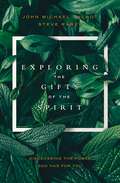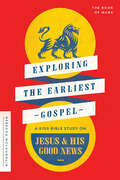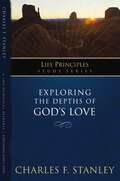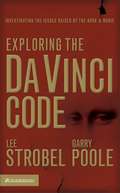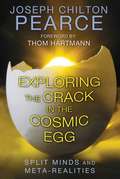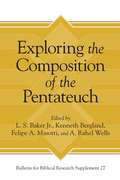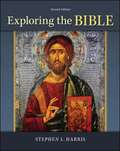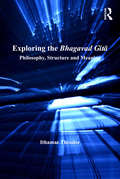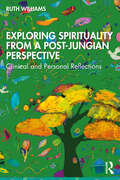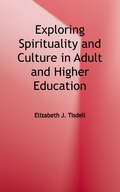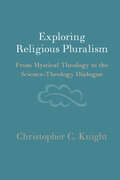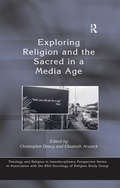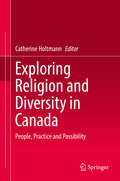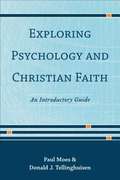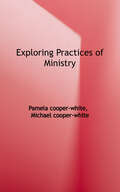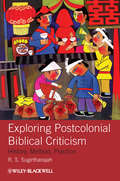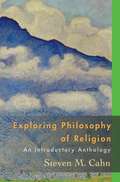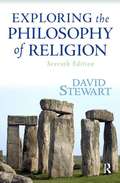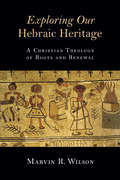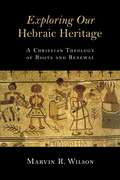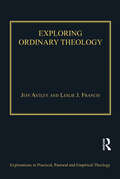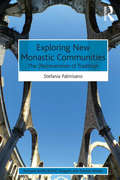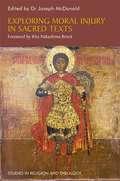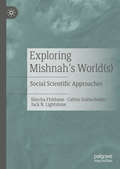- Table View
- List View
Exploring the Gifts of the Spirit: Discovering the Power God Has for You
by John Michael TalbotWhat do spiritual gifts have to do with our daily lives?Spiritual gifts are more than just ancient wisdom to be studied. They are practical components of our everyday lives.Famed songwriter and musician John Michael Talbot—an early proponent of the unified Charismatic and Catholic movement --weaves together prayer, biblical teaching, songs, and contemplative thought to examine the gifts of the Holy Spirit.Chapters focus on:Speaking in tongues and its interpretationHealing and the divine power of the body, soul, and spiritProphecy and being empowered to show God&’s truthMiracles and other supernatural interventionsDiscernment and the types of spiritsWritten in a personal, compelling tone, Exploring the Gifts of the Spirit presents ancient wisdom with an accessible, down-to-earth, practical approach. Talbot skillfully introduces readers to wisdom from varied saints and Church leaders, biblical studies, theology, and church history, helping believers moor their spiritual experience to God&’s truth.
Exploring the Earliest Gospel: A Kids Bible Study on Jesus and His Good News
by Rebecca McLaughlinHelping kids fall in love with God and His Word as they study the Bible for themselvesNow more than ever, kids need to know and explore their Bibles.Getting our kids engaged with Scripture early on is vital to their discipleship. In fact, research shows that Bible reading is the number one indicator for spiritual growth. Exploring the Earliest Gospel gives kids the chance and tools to know God through His Word.In this kids&’ Bible study, Rebecca McLaughlin and her young theologian daughters Miranda (12) and Eliza (10) guide your kids through the book of Mark. This adult-child collaboration will help your kids see themselves not just as passive recipients of teaching from grown-ups, but active participants who can engage with the Bible for themselves. At its heart, Exploring the Earliest Gospel is a study of a person: Jesus. Through sixty-six days of fun and fast-paced study, your kids will get to understand more of Jesus&’ life, death, and resurrection. Mark&’s Gospel was the first gospel to be written, and it&’s based on the memories of Jesus&’ disciple Peter. Since Peter was an act first, think later kind of guy, your kids will notice that Mark uses the word &“immediately&” a lot. This is an action-packed book! As your young disciples enter the stories that were written and meant for them, they will learn how to observe, interpret, and apply God&’s Word to their lives.If you&’re looking for a theologically rich, accessible bible study that helps your kids know and fall in love with Jesus and paves the way to a lifelong love of God and the Bible, give them Exploring the Earliest Gospel.
Exploring the Depths of Gods Love (Life Principles Study Series)
by Charles StanleyFor God so loved the world ... and then what?It's one of the first verses you learn in Sunday School, but do you really understand what that means? Through Exploring the Depths of God's Love, a part of Dr. Stanley's Life Principles Study Series, the Scriptures are stripped down to the very basic, practical guidelines He gave us. You'll learn what it really means to love God and to serve and obey Him and as a result, you'll discover how much God loves you, and how His love will transform you forever.
Exploring the Da Vinci Code: Investigating the Issues Raised by the Book and Movie
by Garry D. Poole Lee StrobelExploring the Da Vinci Code takes you on a fascinating journey to London, Paris, and California with Lee Strobel and Garry Poole as they investigate the claims made by Dan Brown in his novel, The Da Vinci Code. It provides quick, straightforward answers to the most troubling aspects of the popular novel and major motion picture, which is scheduled to release in theatres May 19, 2006. This outreach book is designed so readers can give multiple copies to friends, family, coworkers—anyone who may be struggling with the misconceptions fostered by The Da Vinci Code. Exploring the Da Vinci Code is not to be confused with Zondervan’s DVD Group discussion resource, Discussing the Da Vinci Code. The latter links a DVD to a group discussion guide and equips group members to personally combat the misunderstandings that many readers of The Da Vinci Code have.
Exploring the Crack in the Cosmic Egg: Split Minds and Meta-Realities
by Joseph Chilton Pearce Thom HartmannThe classic follow-up to the bestselling The Crack in the Cosmic Egg • Explains the process of acculturation and the mechanisms that create our self-limiting “cosmic egg” of consensus reality • Reveals how our biological development innately creates a “crack” in our cosmic egg--leaving a way to return to the unencumbered consciousness of childhood • Explores ways to discover and explore the “crack” to restore wholeness to our minds and reestablish our ability to create our own realities In this classic follow-up to his bestselling The Crack in the Cosmic Egg, Joseph Chilton Pearce explains the process of acculturation and the mechanisms that create our self-limiting “cosmic egg” of consensus reality. Laying the groundwork for his later classic Magical Child, Pearce shows that we go through early childhood connecting with the world through our senses. With the development of language and the process of acculturation not only do our direct experiences of the world become much less vivid but our innate states of nonordinary consciousness become suppressed. Trapped in a specific cultural context--a “cosmic egg”--we are no longer able to have or even recognize mystical experiences not mediated by the limitations of our culture. Motivated primarily by a fear of death, our enculturation literally splits our minds and prevents us from living fully in the present. Drawing from Carlos Castaneda’s writings about Don Juan and the sense of “body-knowing,” Pearce explores the varieties of nonordinary consciousness that can help us return to the unencumbered consciousness of our infancy. He shows that just as we each create our own cosmic egg of reality through cultural conditioning, we also innately create a “crack” in that egg. Ultimately certain shifts in our biological development take place to offset acculturation, leaving an avenue of return to our primary state. Pearce examines the creation of the “egg” itself and ways to discover its inherent cracks to restore wholeness to our minds, release us from our fear of death, and reestablish our ability to create our own realities through imagination and biological transcendence.
Exploring the Composition of the Pentateuch (Bulletin for Biblical Research Supplement #27)
by L. S. Baker Kenneth Bergland Felipe A. Masotti A. Rahel WellsFor many years, the historical-critical quest for a reconstruction of the origin(s) and development of the Pentateuch or Hexateuch has been dominated by the documentary hypothesis, the heuristic power of which has produced a consensus so strong that an interpreter who did not operate within its framework was hardly regarded as a scholar. However, the relentless march of research on this topic has continued to yield new and refined analyses, data, methodological tools, and criticism. In this spirit, the contributions to this volume investigate new ideas about the composition of the Pentateuch arising from careful analysis of the biblical text against its ancient Near Eastern background.Covering a wide spectrum of topics and diverging perspectives, the chapters in this book are grouped into two parts. The first is primarily concerned with the history of scholarship and alternative approaches to the development of the Pentateuch. The second focuses on the exegesis of particular texts relevant to the composition of the Torah. The aim of the project is to foster investigation and collegial dialogue in a spirit of humility and frankness, without imposing uniformity.In addition to the editors, the contributors include Tiago Arrais, Richard E. Averbeck, John S. Bergsma, Joshua A. Berman, Daniel I. Block, Richard Davidson, Roy E. Gane, Duane A. Garrett, Richard S. Hess, Benjamin Kilchör, Michael LeFebvre, Jiří Moskala, and Christian Vogel.
Exploring the Composition of the Pentateuch (Bulletin for Biblical Research Supplement #27)
by L. S. Baker Kenneth Bergland Felipe A. Masotti A. Rahel WellsFor many years, the historical-critical quest for a reconstruction of the origin(s) and development of the Pentateuch or Hexateuch has been dominated by the documentary hypothesis, the heuristic power of which has produced a consensus so strong that an interpreter who did not operate within its framework was hardly regarded as a scholar. However, the relentless march of research on this topic has continued to yield new and refined analyses, data, methodological tools, and criticism. In this spirit, the contributions to this volume investigate new ideas about the composition of the Pentateuch arising from careful analysis of the biblical text against its ancient Near Eastern background.Covering a wide spectrum of topics and diverging perspectives, the chapters in this book are grouped into two parts. The first is primarily concerned with the history of scholarship and alternative approaches to the development of the Pentateuch. The second focuses on the exegesis of particular texts relevant to the composition of the Torah. The aim of the project is to foster investigation and collegial dialogue in a spirit of humility and frankness, without imposing uniformity.In addition to the editors, the contributors include Tiago Arrais, Richard E. Averbeck, John S. Bergsma, Joshua A. Berman, Daniel I. Block, Richard Davidson, Roy E. Gane, Duane A. Garrett, Richard S. Hess, Benjamin Kilchör, Michael LeFebvre, Jiří Moskala, and Christian Vogel.
Exploring the Bible
by Stephen HarrisDesigned for the introductory Biblical studies course, this text surveys both the Old and New Testaments. This book takes a clear and honest presentation of the passages in the Bible from the legacy of Genesis to the book of Revelation. Narratives include Jesus's life and teachings and the promises of heaven and a new earth as they are outlined in the book of Revelation.
Exploring the Bhagavad Gita: Philosophy, Structure and Meaning
by Ithamar TheodorThe Bhagavad Gita is a unique literary creation but deciphering its meaning and philosophy is not easy or simple. This careful study of the Bhagavad Gita approaches the ancient text with a modern mind and offers a unifying structure which is of a universal relevance. Combining the philosophical-theoretical with the ethical-practical, Ithamar Theodor locates his study within comparative theology and identifies the various layers of meaning. The full text of the Bhagavad Gita is presented in new translation, divided into sections, and accompanied by in-depth commentary. This book makes the Bhagavad Gita accessible to a wide variety of readers, helping to make sense of this great spiritual classic which is one of the most important texts of religious Hinduism.
Exploring Spirituality from a Post-Jungian Perspective: Clinical and Personal Reflections
by Ruth WilliamsDerived from Ruth Williams’ more than 40-year immersion in spiritual practice, as well as her clinical experience as a Jungian analyst, this thought-provoking volume explores the nature of spiritual paths and trajectories in practical ways, incorporating personal anecdote and ground-breaking academic research and providing a window into how Jungian practitioners work with soul and spirit. Williams explores the nature of being a human using the Yiddish idea of a person being a ‘mensch’, which means being a decent human being, having humanity and living ethically with integrity. The idea of ‘grace’ is the thread that runs through the book—the mystery that binds things together and makes life meaningful, purposeful, potentially joyful and spiritually fulfilling. Williams sees ‘grace’ as being that which underpins and lies behind synchronicity and divinatory practices and as a force by which we can learn to be guided. Rooted in clinical work, Exploring Spirituality from a Post-Jungian Perspective is fascinating reading for Jungian analysts, therapists and academics, as well as for general readers interested in a spiritual journey, both personally and for clinical purposes.
Exploring Spirituality and Culture in Adult and Higher Education
by Elizabeth J. TisdellThis book is written from the unique perspective of teacher, researcher, and author Elizabeth Tisdell who has extensive experience dealing with culture, gender, and educational equity issues in secular adult and higher education classrooms, and formerly in pastoral and religious education settings on college campuses. <p><p>This important book discusses how spiritual development is informed by culture and how this knowledge is relevant to teaching and learning. For educators, an understanding of how spirituality is informed by culture, and how spirituality assists in meaning-making, can aid in their efforts to help their students' educational experiences become more transformative and culturally relevant.
Exploring Religious Pluralism: From Mystical Theology to the Science-Theology Dialogue
by null Christopher C. KnightHow can we more deeply understand religious pluralism? In this study, Christopher C. Knight suggests that current explorations of religious pluralism may be supplemented by combining new thinking about divine action with the kind of 'mystical theology' that sees doctrinal statements as aids to contemplation rather than as philosophical truth claims. While Knight sees the 'perennialist' tradition of pluralistic thinking as deeply flawed, he nevertheless proposes that we can adopt a kind of neo-perennialism in which the supposed incompatibilities of different faith traditions may still be seen in the way that perennialists have usually considered them: as relating only to the exotericdimension of religious faith and practice. In this way, he suggests, the perennialist notion of esoteric ecumenism may still be valid. He cautions, nevertheless, that at a methodological level, there may be defensible reasons to hesitate before adopting a full-blown pluralism of this kind.
Exploring Religion and the Sacred in a Media Age (Theology and Religion in Interdisciplinary Perspective Series in Association with the BSA Sociology of Religion Study Group)
by Christopher DeacyIn recent years, there has been growing awareness across a range of academic disciplines of the value of exploring issues of religion and the sacred in relation to cultures of everyday life. Exploring Religion and the Sacred in a Media Age offers inter-disciplinary perspectives drawing from theology, religious studies, media studies, cultural studies, film studies, sociology and anthropology. Combining theoretical frameworks for the analysis of religion, media and popular culture, with focused international case studies of particular texts, practices, communities and audiences, the authors examine topics such as media rituals, marketing strategies, empirical investigations of audience testimony, and the influence of religion on music, reality television and the internet. Both academically rigorous and of interest to a wider readership, this book offers a wide range of fascinating explorations at the cutting edge of many contemporary debates in sociology, religion and media, including chapters on the way evangelical groups in America have made use of The Da Vinci Code and on the influences of religion on British club culture and electronic dance music.
Exploring Religion and Diversity in Canada: People, Practice and Possibility
by Catherine HoltmannThis book is intended for advanced undergraduate and graduate students interested in learning about the many ways in which religious diversity is manifest in day-to-day life Canada. Each chapter addresses the challenges and opportunities associated with religious diversity in a different realm of social life from families to churches, from education to health care, and from Muslims to atheists. The contributors present key concepts, relevant statistical data and real-life stories from qualitative data. The content of the book is supplemented by links to online learning resources including videos, websites and photo essays.
Exploring Psychology and the Christian Faith: An Introductory Guide
by Paul Moes Donald J. TellinghuisenThis introductory guide provides a coherent framework for considering psychology from a Christian perspective.
Exploring Practices of Ministry
by Pamela Cooper-White Michael Cooper-WhiteFortress Press Foundations for Learning series prepares students for academic success through compelling resources that kick-start their educational journey into professional Christian ministry. <p><p>In Exploring Practices of Ministry, Pamela Cooper-White and Michael Cooper-White share insights from their extensive experience as parish ministers, church agency executives, and seminary educators in diverse multicultural and international contexts. Pamela, an Episcopal priest who teaches pastoral theology, care, and counseling, is also a pastoral psychotherapist with an extensive clinical background. Michael, a Lutheran pastor and seminary president, is also a pilot and flight instructor and has served as a chaplain with the Civil Air Patrol. <p><p>The authors share their wisdom with seminarians and other readers seeking to deepen theological reflection and expand skills as ministry practitioners. While not all readers are preparing to be ordained ministers, most will engage in many of the practices described in the book: preaching and public speaking, teaching, leading liturgies, conducting ceremonies, counseling and offering pastoral support for persons undergoing life transitions, and serving as organizational leaders in congregations, chaplaincies, social ministries, and in the public arena. This book is a companion journal for pilgrims on the way to becoming confident practitioners of ministry.
Exploring Postcolonial Biblical Criticism: History, Method, Practice
by R. S. SugirtharajahExploring Postcolonial Biblical Criticism: History, Method, Practice offers a concise and multifaceted overview of the origins, development, and application of postcolonial criticism to biblical studies.? Offers a concise and accessible introduction to postcolonial biblical studies Provides a comprehensive overview of postcolonial studies by one of the field's most prominent figures Explains one of the most innovative and important developments in modern biblical studies Accessible enough to appeal to general readers interested in religion
Exploring Philosophy of Religion: An Introductory Anthology
by Steven M. CahnWhat are the inherent claims that lie at the core of religion? Which of them are defensible by reason, and which are not? Potential answers to these questions and more, from influential philosophers past and present, may be found in this short book edited by Steven M. Cahn. Featuring fifty-two classic and contemporary readings, Exploring Philosophy of Religion: Text and Readings is a topically-organized anthology that presents broad coverage of seven major areas in the philosophy of religion - the concept of God, the existence of God, religious language, miracles and mysticism, belief in God, resurrection and immortality, and religious pluralism - in a clear and accessible format. With guiding introductory material from Professor Cahn, each of the readings has been carefully selected and edited for maximum clarity and comprehensiveness; only the most essential material is included. To further foster understanding, the text also features an appendix consisting of Professor Cahn's monograph, God, Reason, and Religion, which provides a synthesis and interpretation of the crucial issues raised throughout the readings.
Exploring The Philosophy Of Religion
by David StewartExploring the Philosophy of Religion, 7th Edition, combines the best features of a text and a reader by offering clear analysis coupled with important primary-source readings. Professor David Stewart called upon his 30-plus years of teaching experience to introduce students to the important study of philosophical issues raised by religion. Beginning students often find primary sources alone too difficult so this text offers primary source materials by a variety of significant philosophers--including a balanced blend of classical and contemporary authors--but the materials are supported by clearly written introductions, which better prepare students to understand the readings.
Exploring Our Hebraic Heritage: A Christian Theology of Roots and Renewal
by Marvin R. WilsonInformed theological guide to the Jewish foundations of the Christian faith In this very readable sequel to his popular book Our Father Abraham — which has sold more than 70,000 copies — Marvin Wilson illuminates theological, spiritual, and ethical themes of the Hebrew scriptures that directly affect Christian understanding and experience.Exploring Our Hebraic Heritage draws from both Christian and Jewish commentary in discussing such topics as thinking theologically about Abraham, understanding the God of Israel and his reputation in the world, and what it means for humans to be created in God’s image. Wilson calls for the church to restore, renew, and protect its foundations by studying and appreciating its origins in Judaism. Designed to serve as an academic classroom text or for use in personal or group study, the book includes hundreds of questions for review and discussion.
Exploring Our Hebraic Heritage: A Christian Theology Of Roots And Renewal
by Marvin R. WilsonIn this very readable sequel to his popular book Our Father Abraham -- which has sold more than 70,000 copies -- Marvin Wilson illuminates theological, spiritual, and ethical themes of the Hebrew scriptures that directly affect Christian understanding and experience. Exploring Our Hebraic Heritage draws from both Christian and Jewish commentary in discussing such topics as thinking theologically about Abraham, understanding the God of Israel and his reputation in the world, and what it means for humans to be created in God's image. Wilson calls for the church to restore, renew, and protect its foundations by studying and appreciating its origins in Judaism. Designed to serve as an academic classroom text or for use in personal or group study, the book includes hundreds of questions for review and discussion.
Exploring Ordinary Theology: Everyday Christian Believing and the Church (Explorations in Practical, Pastoral and Empirical Theology)
by Leslie J. Francis'Ordinary theology' characterizes the reflective God-talk of the great majority of churchgoers, and others who remain largely untouched by the assumptions, concepts and arguments that academic theology takes for granted. Jeff Astley coined the phrase in his innovative study, Ordinary Theology: Looking, Listening and Learning in Theology, arguing that 'speaking statistically ordinary theology is the theology of God's Church'. A number of scholars have responded to this and related conceptualizations, exploring their theological implications. Other researchers have adopted the perspective in examining a range of Church practices and contexts of Christian discipleship, using the tools of empirical study. Ordinary theology research has proved to be key in uncovering people's everyday lay theology or ordinary dogmatics. Exploring Ordinary Theology presents fresh contributions from a wide range of authors, who address the theological, empirical and practical dimensions of this central feature of ordinary Christian existence and the life of the Church.
Exploring New Monastic Communities: The (Re)invention of Tradition (AHRC/ESRC Religion and Society Series)
by Stefania PalmisanoExamining the recent radical re-invention of monastic tradition in the everyday life of New Monastic Communities, Exploring New Monastic Communities considers how, growing up in the wake of Vatican II, new Catholic communities are renewing monastic life by emphasizing the most innovative and disruptive theological aspects which they identify in the Council. Despite freely adopting and adapting their Rule of Life, the new communities do not belong to pre-existing orders or congregations: they are gender-mixed with monks and nuns living under the same roof; they accept lay members whether single, married or as families; they reject enclosure; they often limit collective prayer time in order to increase time for labour, evangelization and voluntary social work; and are actively involved in oecumenical and interreligious dialogue, harbouring thinly-veiled sympathy with oriental religions, from which they sometimes adopt beliefs and practices. Offering unique sociological insights into New Monastic Communities, and shedding light on questions surrounding New Religious Movements more generally, the book asks what 'monastic' means today and whether these communities can still be described as 'monastic'.
Exploring Moral Injury in Sacred Texts
by Amir Hussain Brad Kelle Daniel C. Maguire David R. Blumenthal John Thompson Joseph Mcdonald Kelly Denton-Borhaug Michael Yandell Nancy Bowen Rita Nakashima Brock Warren CarterMoral injury is a profound violation of a human being's core moral identity through experiences of violence or trauma. This is the first book in which scholars from different faith and academic backgrounds consider the concept of moral injury not merely from a pastoral or philosophical point of view but through critical engagement with the sacred texts of Judaism, Christianity, Islam, Buddhism and American Civil Religion. This collection of essays explores the ambiguities of personal culpability among both perpetrators and victims of violence and the suffering involved in accepting personal agency in trauma. Contributors provide fresh and compelling readings of texts from different faith traditions and use their findings to reflect on real-life strategies for recovery from violations of core moral beliefs and their consequences such as shame, depression and addiction. With interpretations of the sacred texts, contributors reflect on the concerns of the morally-injured today and offer particular aspects of healing from their communities as support, making this a groundbreaking contribution to the study of moral injury and trauma.
Exploring Mishnah's World(s): Social Scientific Approaches
by Simcha Fishbane Calvin Goldscheider Jack N. LightstoneThis book provides a new conceptual and methodological framework the social scientific study of Mishnah, as well as a series of case studies that apply social science perspectives to the analysis of Mishnah's evidence. The framework is one that takes full account of the historical and literary-historical issues that impinge upon the use of Mishnah for any scholarly purposes beyond philological study, including social scientific approaches to the materials. Based on the framework, each chapter undertakes, with appropriate methodological caveats, an avenue of inquiry open to the social scientist that brings to bear social scientific questions and modes of inquiry to Mishnaic evidence.
